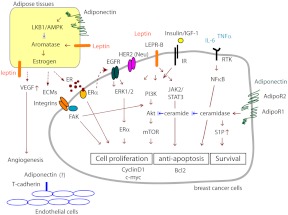Fig. 2.
Crosstalk among the signaling pathways linking obesity and breast cancer progression. The EGFR (epidermal growth factor receptor) family, such as EGFR (ErbB1), and ErbB2/HER2/Neu, plays an important role in tumorigenesis by inducing cells to proliferate and to survive. Upon ligand binding to EGFR, downstream pathways including kinases such as PI3K, ERK, and JAK/STAT are activated in a coordinated manner to promote cell proliferation and survival. The estrogen receptor ERα triggers EGFR pathways, which are also directly regulated by adipokines, such as adiponectin and leptin through their receptors AdipoR1, AdipoR2, and LEPR-B, respectively, which are expressed in mammary tumor cells. Importantly, adiponectin and leptin modulate estrogen (ER) production through regulation of aromatase activity in adipose tissue, resulting in altering ERα and EGFR pathways in cancer cells. LEPR-B mediated downstream signaling, such as PI3K, ERK and JAK/STAT3 is well-known to be involved in protumorigenic pathways. Adiponectin actions are multifaceted. Activation of ceramidase activity through AdipoR1 and AdipoR2 causes proangiogenic and antiapoptotic responses. Ceramide inhibits Akt pathways, whereas S1P activates antiapoptotic pathways. Inflammatory cytokines, such as TNFα and IL-6, and ECMs secreted from adipose tissue also contribute to cancer progression through their receptors. These include RTKs (receptor-tyrosine kinases) and integrin-mediated pathways. Downstream mediators, such as NF-κB and focal adhesion kinase (FAK) convey the EGFR signal to the nucleus and also affect other adipokine-stimulated downstream pathways. High insulin levels frequently observed in obese subjects augment promitogenic insulin/IGF-I signaling. Proangiogenic factors, such as vascular endothelial growth factor (VEGF) secreted from adipose tissue, contribute to angiogenic capacities of endothelial cells within the tumor microenvironment. Adiponectin receptors and T-cadherin expressed in tumor endothelial cells may be associated with angiogenesis. Therefore, various signaling pathways triggered by adipokines converge upon oncogenic signaling pathways in mammary tumor cells to promote tumor progression.

